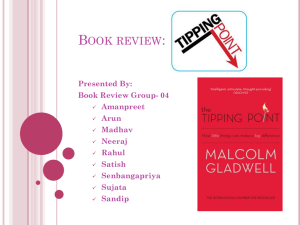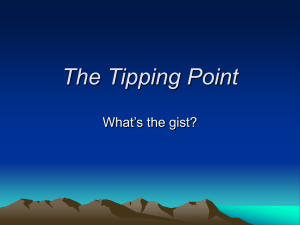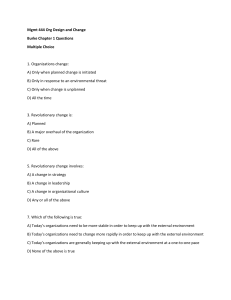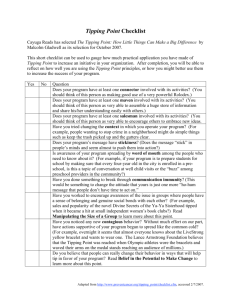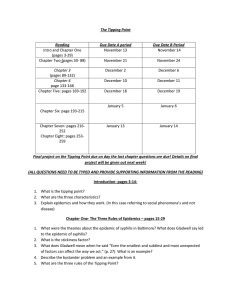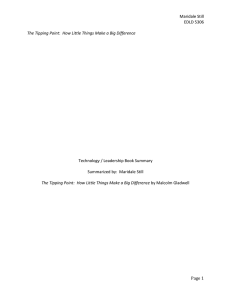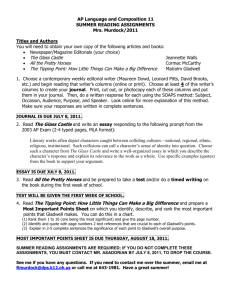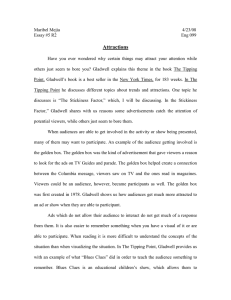The 7 Steps to an International Partnership made in
advertisement
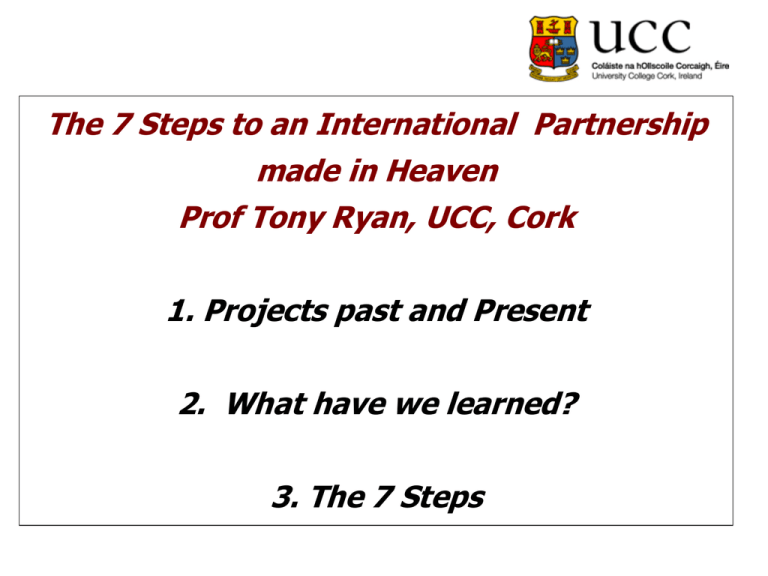
The 7 Steps to an International Partnership made in Heaven Prof Tony Ryan, UCC, Cork 1. Projects past and Present 2. What have we learned? 3. The 7 Steps 1. Omdurman Maternity Hospital, Sudan est. 1957 • 26,000 deliveries per annum • 2002: Return of UK-trained obstetricians. • Reorganization of obstetrical services. • Partnership with CUMH (2002-10). • Logbook (1956-2007). – Evaluate & compare all 60 years of data. Cork Omdurman Partnership Project Returned Obstetricians 2002 • • • • • • 24hr consultant cover with handover MgSO4 for PET Prophylactic antibiotics Thromboprophylaxis Improved anaesthesia Antenatal care Partnership with CUMH 2002-11 • • • • €165,000 Irish Aid €1.5 million equipment Enhanced training & education Support & encouragement OMH 800 725 700 600 500 400 (22) 200 300 266 200 (7) 36 100 2002 Year 2007 Ireland: 1/100,000 OMH: 36/100,000 2007 2005 2003 2001 1999 1997 1995 1993 1991 1989 1987 1985 1983 1981 1979 1977 1975 1974 1972 0 1970 Maternal deaths per 100,000 live births Maternal Mortality Ratio (# actual deaths) Stillbirths Down Neonatal Deaths Unchanged 50 per 1000 40 (Ireland) 30 30 Stillbirth Rate (6) Neonatal Mortality Rate (4) 24 20 16 10 2002 0 Year 19 Irish Health Awards Winner 2011 2. Helping Babies Breath The Problem The intervention: Helping Babies Breath 98% of newborn deaths occur in resource poor countries Every year four million newborns die during their first month of life, 50% dying during delivery and the first 24 hours of life. Study design: Pre-Post HBB The Principle HBB:every The infant Golden Minuteat At birth, deserves, least, an initial evaluation and a trial of basic resuscitation efforts by a trained individual 80 Conclusions Midwives Completed 2013 The Aim To reduce neonatal mortality by teaching HBB to Village Midwives in Sudan Current Study Sponsorer Irish Aid Conclusion 3. CORK - CHACAS JOURNEY Peru vs Ireland INDICATOR PERU IRELAND 30 million 4.5 million Infant Mortality Rate 19 4 Neonatal Mortality Rate 11 2 % of < 5y underweight 6 - % of < 5y with stunting 24 - Maternal mortality ratio 98 3 % of population below international poverty line (1.25 U$/day) 8 0 Population Preventing High Altitude Renal Disease in the Peruvian Andes Dr. Jackelina Pando-Kelly Dept of Paediatrics UCC SCREENING PROGRAM FOR RENAL DISEASE IN CHILDREN IN THE PERUVIAN ANDES Operation Mato Grosso in Chagas • 1970 - Italian volunteers settled in the Peruvian Andes • 1994 -“Mama Ashu “ Hospital in Chacas – 11,000 ft The Highest Pub on Earth Paddy Flaherty’s in Perū Future Peruvian Projects Inaugural UCC Medical Student Electives 2012 The 7 steps to a Global Partnership made in Heaven 1. Find a Partner 2. Recognize the importance of Context 3. Get to Know Your Stakeholders 4. Decide your Objectives 5. Use an Outcome Logic Model 6. Design, Develop, Deliver 7. Look for the Stickiness factor in your Project? Step 1 1. Find a Global Partner – – – – The Law of the Few: the 80/20 principle Find a Connector Who are the Influencers? Who do people turn to when they want to find out about something? Step 2. Context is important 1. Opportunities arise because of Real World Events 2. Epidemics are sensitive to the conditions and circumstances of the times in which they occur. Human behavior is sensitive to and strongly influenced by its environment. 3. Persuasiveness is an important skill Step 3 2. Get to Know Your Stakeholders? – What assumptions are you making about them? – What do they Want? – What do they Need? – It’s not just about you! Step 4 Decide your Objectives – Make a Contract – What Resources can you bring? – What Activities need to be done? Step 5 Use an Outcomes Logic Model 1. 2. 3. 4. 5. Inputs Activities Outputs Outcomes Impact short to medium term Long term Outcomes In order to accomplish our set of activities, we will need the following: In order to address our problem or asset, we will conduct the following activities: We expect that once completed or under way these activities will produce the following evidence of service delivery We expect that if completed or ongoing these activities will lead to the following changes in 1-3 then 4-6 years We expect that if completed these activities will lead to the following changes in 7-10 years Step 6 Step 7 Find the Stickiness Factor The specific content of a message that renders its impact memorable. Sesame Street: Enhanced effective Educational retention in tandem with Entertainment. The 7 steps 1. Find a Partner – – – Find a Connector The Law of the Few: 80/20 Principle Who are the influencers? Who do people turn to? 2. The importance of Context: Epidemics 3. Get to Know Your Stakeholders? – – What do they Want? What do they Need? 4. Decide your Objectives – – – Make a Contract What Resources can you bring? What Activities need to be done? 5. Use an Outcomes logic Model – How are you going to measure success 6. Design, Develop, Deliver 7. Look for the Stickiness factor in your project The 3 Steps to an Partnership Heaven “Now there are Three Steps To Partnership Heaven Just listen and you will plainly see And as life travels on And things do go wrong Just follow steps one, two and three Step one - you find Global Partners to love Step two - They fall in love with you Step three - You work together and hold them tightly Yeah! that sure seems like heaven to me” Thank you The 7 steps 1. Find a Partner 2. Context is important 3. Get to Know Your Stakeholders? 4. Decide your Objectives 5. Use an Outcome Logic Model 6. Design, Develop, Deliver 7. What is the the Stickiness factor for your project? Step 4 Find the Influencers Milgram distributed letters to 160 students in Nebraska, with instructions that they be sent to a stockbroker in Boston (not personally known to them) by passing the letters to anyone else that they believed to be socially closer to the target. The study found that it took an average of six links to deliver each letter. Of particular interest to Gladwell was the finding that just three friends of the stockbroker provided the final link for half of the letters that arrived successfully.[17] This gave rise to Gladwell's theory that certain types of people are key to the dissemination of information. Step 4 Find the Tipping Point The tipping point is that magic moment when an idea, trend, or social behavior crosses a threshold, tips, and spreads like wildfire. Just as a single sick person can start an epidemic of the flu, so too can a small but precisely targeted push cause a fashion trend, the popularity of a new product, or a drop in the crime rate. Step 4 Find the Tipping Point The Law of the Few", or, as Gladwell states, "The success of any kind of social epidemic is heavily dependent on the involvement of people with a particular and rare set of social gifts."[3] According to Gladwell, economists call this the "80/20 Principle, which is the idea that in any situation roughly 80 percent of the 'work' will be done by 20 percent of the participants. Step 4 Find the Tipping Point Connectors, are the people who "link us up with the world ... people with a special gift for bringing the world together."[5] They are "a handful of people with a truly extraordinary knack [... for] making friends and acquaintances".[6] He characterizes these individuals as having social networks of over one hundred people. Step 4 Find the Tipping Point Mavens are "information specialists", or "people we rely upon to connect us with new information."[4] They accumulate knowledge, especially about the marketplace, and know how to share it with others. Gladwell cites Mark Alpert as a prototypical Maven who is "almost pathologically helpful", further adding, "he can't help himself".[8] In this vein, Alpert himself concedes, "A Maven is someone who wants to solve other people's problems, generally by solving his own".[8] According to Gladwell, Mavens start "word-of-mouth epidemics"[9] due to their knowledge, social skills, and ability to communicate. As Gladwell states, "Mavens are really information brokers, sharing and trading what they know".[10] Step 4 Find the Tipping Point Salesmen are "persuaders", charismatic people with powerful negotiation skills. They tend to have an indefinable trait that goes beyond what they say, which makes others want to agree with them. Gladwell's examples include California businessman Tom Gau and news anchor Peter Jennings, and he cites several studies about the persuasive implications of non-verbal cues, including a headphone nod study (conducted by Gary Wells of the University of Alberta and Richard Petty of the University of Missouri) and William Condon's cultural microrhythms study. Step 4 Find the Tipping Point Real world events The Power of Context: Human behavior is sensitive to and strongly influenced by its environment. As Gladwell says, "Epidemics are sensitive to the conditions and circumstances of the times and places in which they occur."[11] For example, "zero tolerance" efforts to combat minor crimes such as fare-beating and vandalism on the New York subway led to a decline in more violent crimes city-wide. Gladwell describes the bystander effect, and explains how Dunbar's number plays into the tipping point, using Rebecca Wells' novel Divine Secrets of the Ya-Ya Sisterhood, evangelist John Wesley, and the high-tech firm W. L. Gore and Associates. Gladwell also discusses what he dubs the rule of 150, which states that the optimal number of individuals in a society that someone can have real social relationships with is 150.[12] Changing minds • In his latest book, Harvard psychologist Howard Gardner offers insights into the phenomenon of changing minds. Why is it so mysterious? How do people become set in a certain way of thinking? And what does it take to change a perspective? As he did in previous books about intelligence, creativity, and leadership, Gardner challenges traditional thinking. He draws on decades of cognitive research to show mind change not as a sudden “epiphany” but as a gradual process that can be actively and powerfully influenced. He identifies seven levers that aid or thwart the process of mind change and provides an original framework that shows how individuals can align these levers to bring about significant changes in perspective and behavior.
